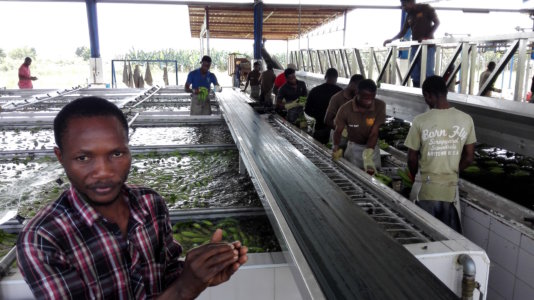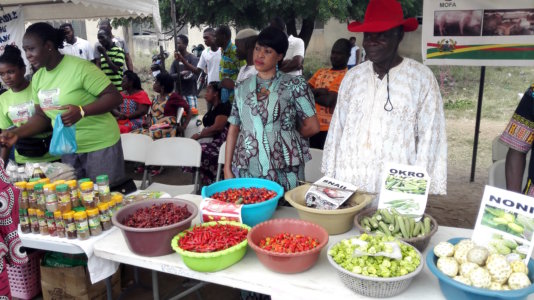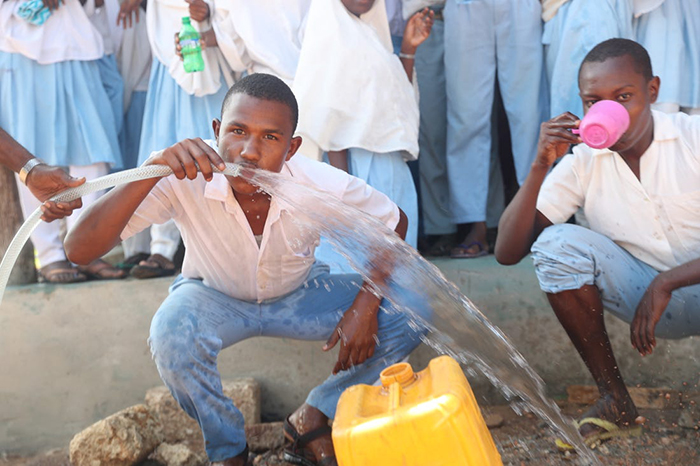- About
- Topics
- Picks
- Audio
- Story
- In-Depth
- Opinion
- News
- Donate
-
Signup for our newsletterOur Editors' Best Picks.Send
Read, Debate: Engage.
| December 05, 2017 | |
|---|---|
| topic: | Humanitarian Aid |
| tags: | #development aid, #Africa, #EU, #development, #African Union (AU), #African Union Summit, #Ghana |
| located: | Ghana |
| by: | Ama Lorenz |
“We can no longer pursue a policy for our countries and regions that is based on the support given by the West, France or the European Union. This has not worked and it will not work,” Akufo-Addo told a joint press conference with Macron, who was visibly surprised by the statements made by the Ghanaian president.
“It is not right for a country like Ghana – 60 years after its independence – to depend on the generosity of European taxpayers when it comes to financial means for health or education,” the Ghanaian president continued.
Akufo-Addo, who has been president of Ghana since January 2017, previously served as foreign minister, minister for regional integration and minister for The New Partnership for Africa’s Development (NEPAD) until 2007.
A few weeks after his inauguration, Akufo-Addo announced in his speech to the nation on 21 February major reforms in economic and educational policies.
Among other things, there is said to be an increase in research and development funds, which would account for one to 2,5 percent of economic output in the short to medium term.
A new spirit of independence
With Akufo-Addo, once again Ghana has a president that continues in the tradition of Kwame Nkrumah. It was him as the country’s first president, who under the slogan of “Independence Now!” led Ghana as one of the first African countries into independence. Now, with Akufo-Addo in charge, the declared government policy 60 years later is: “Ghana Beyond Aid”. Away from development aid to the self-responsibility of African states.
To this, the Ghanaian government wants to create jobs, use political means to boost the economy and make agriculture more productive. The aim of the “Planting for Foods and Jobs” initiative is to reduce domestic food prices, which are too high due to food imports from Europe.
Under a “one village, one dam policy”, the production methods of more than half of Ghanaians working in agriculture are aimed to be made more efficient and possible all year-round. Raw materials then no longer will be exported, but processed in Ghana’s own factories. To this end, Akufo-Addo wants to build a factory in each of the 216 Ghanaian districts in cooperation with the private sector.
It is especially the private sector, which, according to the new head of government, should help Ghana reduce its debt and become independent from European development cooperation funds.
In many ways, Akufo-Addo is thus not so far removed from the reorientation of European development cooperation with Africa that was recently proclaimed at the AU-EU summit in Abidjan.
Ghana – democratically stable, with big economic challenges ahead
Europe is one of Ghana’s major trading partners and its largest export market. Almost half of all export products in Ghana, 42.9%, with an export value of three billion euros, went to Europe in 2012. In comparison, Ghana’s export share to China in the same year was only 6.5%.
This is a blessing and a curse at the same time. While small and medium-sized enterprises, in particular, are trying to meet European quality labels and hope for more exports to Europe in the future, they are at the same time suffering from EU trade restrictions, European state subsidies and the announced free trade agreements between the EU and Latin America.
Especially in agriculture, Latin American countries are direct competitors on the European market and far ahead in terms of distribution logistics and industrialisation of the agricultural sector.
In addition, Ghana’s economy has shrunk by more than ten percent since 2011. A reason for this is, among other things, the falling oil price. Revenues from the oil reserves found off the coast of Ghana in 2007 are contributing less than ten percent to the country’s GDP. Ghana’s oil industry is stagnating due to the very low oil prices and maritime border disputes with the Ivory Coast.
Without additional development cooperation funds from Europe, the Ghanaian government has thus far not been able to secure projects in the social and labour market sectors alone.
For example, the EU’s National Indicative Program – Ghana (2014-2020) provides € 323 million worth of development aid in the areas of governance, education, social protection and agricultural development. Half of this (€ 160 million) is meant to flow into the expansion of the agricultural economy to be reformed by Ghana’s government by 2020.
African common market as a vision for the future
The words of the Ghanaian president now addressed to Macron are therefore more likely to be understood as a call to African heads of state than to international donors.
Reforms called for by Akufo-Addo need a strong domestic African market if the country wants to become independent from European aid. But just in this case, there are no optimistic signs. Instead of having equal trade deals with African neighbours, there are rather unloved dependencies, especially with Nigeria.
Ghana is still dependent on gas supplies from Nigeria despite having a significant amount of its own still unsubsidised natural gas reserves. It was not until the end of June 2016 that the Nigerian gas supplier ceased deliveries for non-payments and Ghana had to be supported by an IMF rescue package of $917 million.
Akufo-Addo received support for his reform process from Rwanda. On the sidelines of the Global Business Forum Africa in Dubai on 1 November, Rwandan President Paul Kagame pledged his support.
Ghana can draw on the positive experiences of Rwanda, especially when it comes to the implementation of a GPS-based National Digital Property Addressing System, the introduction of an identity card, a paperless port system and the electronic registration of companies. This is an important step towards Pan-African standards of cooperation.
Akufo-Addo must now prove in the remaining one and a half years of his term whether the words he addressed to his French counterpart will be followed by concrete actions.


By copying the embed code below, you agree to adhere to our republishing guidelines.
